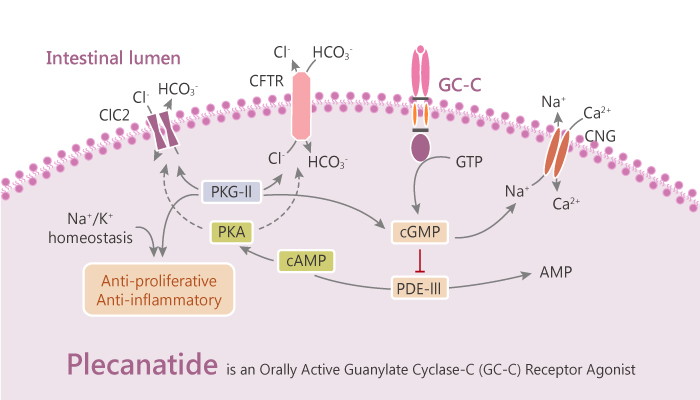Guanylyl cyclase-C (GC-C) is a transmembrane receptor for bacterial heat-stable enterotoxin and the mammalian peptides guanylin and uroguanylin. Guanylyl cyclase-C mediates intestinal ion secretion and affects intestinal cell growth via cyclic GMP signaling.
Plecanatide is a structurally related analog of uroguanylin, which is an endogenous ligand of guanylate cyclase-C (GC-C). Furthermore, Plecanatide exhibits potent cGMP-stimulatory activity in T84 cells. Plecanatide also effectively ameliorates colitis in TCRα-/- mice, a model of spontaneous colitis.

In this study, oral treatment with Plecanatide effectively ameliorates colitis in acute and chronic models of murine experimental colitis. The anti-inflammatory activity of Plecanatide is comparable to that achieved after treatment with Sulfasalazine or 5-amino salicylic acid. Plecanatide acts as a potent analog of UG that binds and activates GC-C receptors to stimulate production of cGMP in a pH-dependent manner. In addition, Plecanatide treatment similarly reducea production of RANTES, IL-17 and MIP-1α, with a concomitant increase in IL-10 in colon explants from TCRα-/- mice.
Plecanatide is a guanylate cyclase agonist, and a 16 amino acid synthetic peptide that is a structural analog of human uroguanylin. Moreover, Plecanatide preferentially binds guanylate cyclase-C with high affinity in the slightly acidic environments of the duodenum. Plecanatide has the same mechanism of action as uroguanylin, stimulating the cGMP signalling axis in a pH-sensitive manner to induce fluid and electrolyte secretion and relieve constipation. Like linaclotide, Plecanatide also produces visceral analgesia, suggesting a drug class effect reflecting the mechanism of action (increased intracellular cGMP).
All in all, Plecanatide is a luminally acting secretagogue that is efficacious and safe for the treatment of chronic idiopathic constipation (CIC).